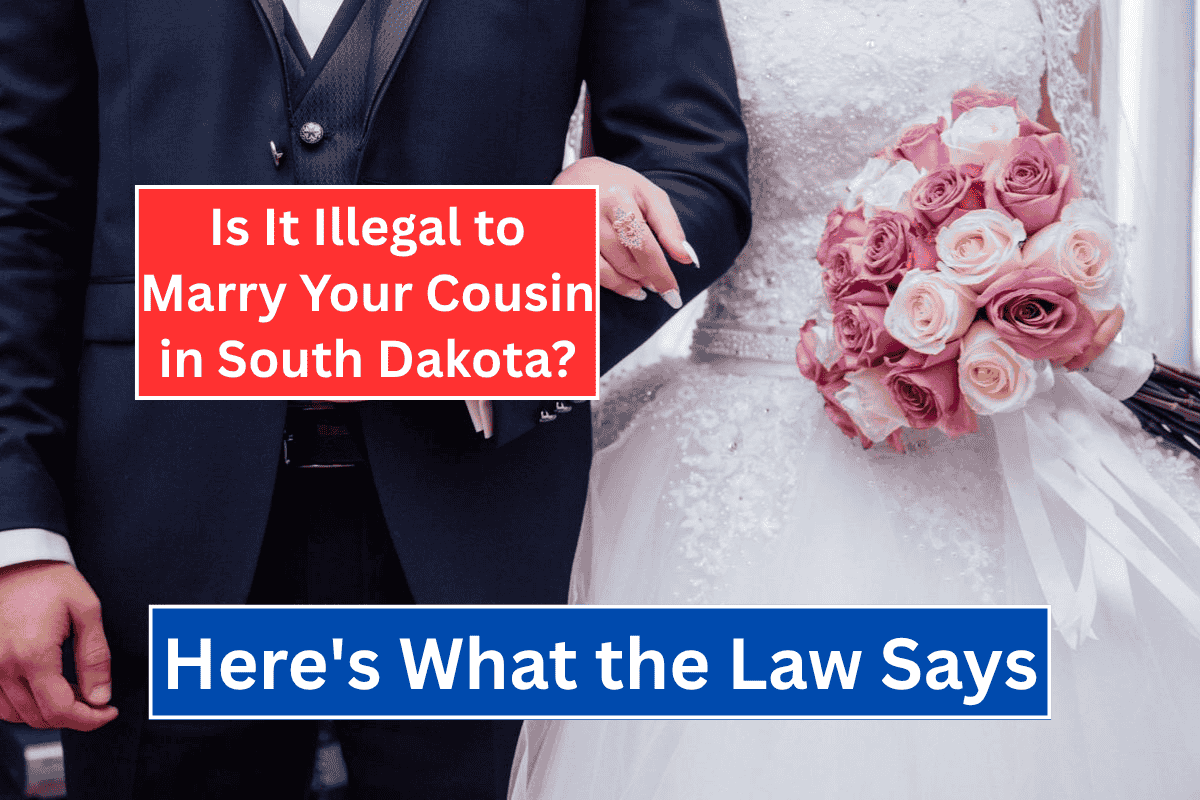In South Dakota, the laws surrounding cousin marriage are clear: it is illegal for first cousins to marry. However, there are exceptions for more distant cousins, and the law also prohibits half first cousins from marrying.
This article explains the legal aspects of cousin marriage in South Dakota and clarifies what the laws say about different relationships.
What Do South Dakota Marriage Laws Say About First Cousins?
South Dakota has specific laws in place regarding cousin marriage. According to these laws, marriages between parents and children, siblings (both full and half-blood), and cousins (both full and half-blood) are strictly prohibited.
The law also extends to relationships formed through adoption, meaning that first cousins and half first cousins cannot marry, regardless of whether the relationship is legitimate or through adoption.
The section of the law that bans first cousin marriages states:
“Marriages between cousins of the half as well as of the whole blood, are null and void from the beginning, whether the relationship is legitimate or illegitimate.”
What Does “Of the Half as Well as of the Whole Blood” Mean?
The terms “half-blood” and “whole-blood” are used to describe the nature of familial relationships. Full siblings share both parents, making them “whole blood” relatives. Half-siblings, however, share only one parent and are considered “half-blood” relatives.
- First cousins are the children of full siblings (whole blood).
- Half first cousins are the children of half-siblings (half blood).
So, while first cousins are generally prohibited from marrying in South Dakota, half first cousins are also banned under state law.
Has the Ban Always Been in Place?
Yes, the ban on first cousin marriages has been in place in South Dakota since the 1860s. The law has remained largely unchanged since its introduction, reflecting the state’s stance on cousin marriages.
Are There Any Exceptions to the Laws?
Unlike some states that allow first cousins to marry under specific circumstances, South Dakota has a blanket ban. There are no exceptions based on age, fertility, or other criteria. This means that no matter the situation, first cousins cannot marry within the state.
Types of Cousins That Can Get Married in South Dakota
While first cousins and half first cousins are not allowed to marry in South Dakota, more distant cousins can.
- First cousins once removed (children of your first cousins) are permitted to marry.
- Second cousins (children of your parents’ first cousins) and any more distant cousins are also allowed to marry in the state.
These relationships are far enough removed that the law does not consider them as close enough to be prohibited.
Does the South Dakota Marriage Application Form Ask If You’re Related?
In some U.S. states, the marriage application form includes a question asking whether the couple has a blood relationship. However, in South Dakota, the marriage application form does not ask this question. This means that couples may not be immediately aware of the legal restrictions until they review the marriage laws.
When signing the form, individuals are affirming that no legal impediments exist to their marriage, so it’s important to be aware of the law beforehand.
Do Nearby States Allow First Cousins to Marry?
South Dakota is bordered by six states: Iowa, Minnesota, Montana, Nebraska, North Dakota, and Wyoming. None of these states allow first cousins to marry.
So, if you’re considering marrying your first cousin and live in one of these states, you may need to look for another legal alternative.
For example, Colorado is one state nearby where first cousin marriages are allowed, making it a potential option for couples in South Dakota who wish to marry.
What About Religious Weddings, Specifically Catholic Marriages?
Even if first cousins marry in another state where it is legal, they may face challenges if they wish to marry in a Roman Catholic church. The Catholic Church has historically discouraged first cousin marriages.
However, in recent years, the church has become more flexible and allows first cousins to marry with special permission, known as a dispensation.
For second cousins and beyond, no special permission is required for a Catholic marriage, though it’s still good practice to inform the priest of your relationship before the ceremony.
South Dakota law prohibits first cousin and half first cousin marriages, and the ban has been in place for many years. More distant cousins, such as first cousins once removed or second cousins, are allowed to marry in the state.
While other states may offer exceptions or allowances, South Dakota has a strict rule with no exceptions. If you live in South Dakota and are considering marrying a first cousin, it’s crucial to know the legal restrictions and consider relocating to a state with more lenient cousin marriage laws if necessary.












